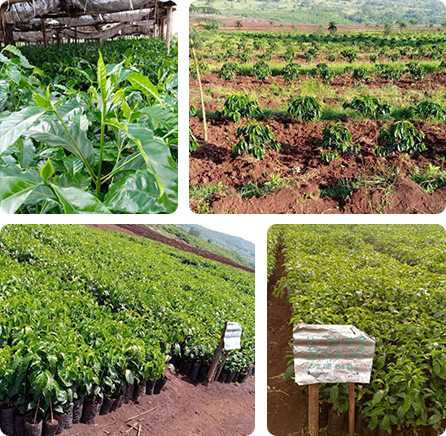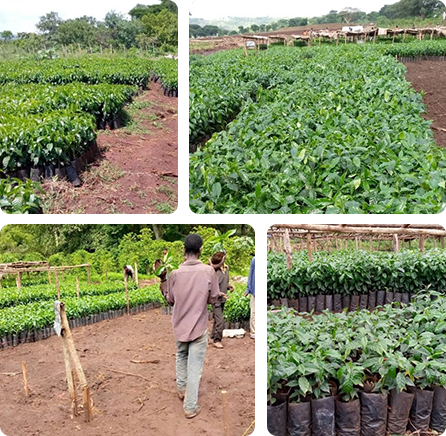Debeka.

Debeka Farm is one of the main farms of Kerchanshe. Coffee is grown under a sprawling one-hectare greenhouse so that they are grown uniformly.
All agronomic practices are computer controlled using smart techniques. Disease resistant varieties are cultivated and other preventive methods like thinning, pruning are used to prevent weeds.
Only organic fertilizers made up of mixture of forest soil, parchment coffee and loam soil are used to increase our production (yield). Coffee seedlings are grown in nursery beds or polybags and are planted in the coffee fields when they reach 20-40 cm. The coffee bean start germination with an interval of 15 days and drip irrigation is used.
Two methods are used for the germination of seeds. In one method, coffee seeds are pre-germinated by spreading on a sand bed and covering with moist burlap bag sacks or straw.
The seeds are watched closely and removed as soon as radicals emerge. Once pre-germinated, the coffee seedlings are planted in nursery beds containing soil consisting of well-rotted cattle manure and other organic fertilizer. The nursery beds are 1 meter wide and 50 cm deep and seedlings are spaced between 12-15 cm apart 20 cm apart for 30-40 cm tall plants. The nursery beds are shaded 50 % for the first couple months. Shading is reduced slowly and completely removed the last two months before planting coffee seedlings.
An alternative method of germinating coffee beans is to mix the seeds with moist vermiculite or expanded polystyrene and kept in a polythene bag.
For propagation, ripe red cherries are collected, pulped, and the mucilage is removed by fermentation.
The freshly picked coffee seeds (typically referred to as beans) can either be planted immediately or dried for later use. Coffee drying takes place on wire mesh trays in the shade.
Dried coffee seeds can be used up to a year or more if safely stored. The right storage ensures longer seed life.
Premium coffee from Debeka farms is exported to the world market since 2017.
| Closest Town | Yirgacheffe |
|---|---|
| Altitude | 1600-1900 masl |
| Farm Size | 200 hectares |
| Irrigation System | Drip Irrigation & sprinkler |
| Soil Composition | Fertile, deep sandy loam |
| Humidity | 55%-70% |
| Category | Curious |
| Flavour | Spicy Notes Like Cardamom, Clove, Rue and Citrus Like Blueberry, Sweet Lemon, Papaya, Chocolate Notes and Long After Taste Like Lemon Grass. |
| Body | Medium to Full body |
| Acidity | Medium to Medium Pointed or Sharp Pointed |
| Raw | Small to medium sized bean, greenish, grayish in colour |
| Harvest Period | October - December |
| Export Grade | Gr. 1, 2RFA, fair trade and ORG Washed. Gr. 1, 2 RFA, fair trade and ORG Natural. |
| Processing Method | Washed, Natural |
| Approximate Number of Trees Planted per hectare | 5000 |
| Approx. Annual Production | 1,200,000kg |
How We Process Our Coffee

Wet processing method
Washed cherries go into the reception tank and floaters are separated, then pumped into the de-pulper. After being de-pulped by a mechanical de-pulper, the cherries are sorted into two categories: clean and those that still have fruit.
The ones with fruit go to a separate channel to undergo a second de-pulping. Clean cherries are moved with recycled water over to fermentation tanks. If there are any leftover cherries with fruit, they are sent to another tank where they will most likely be processed as commercial grade.
The cherries are dry fermented for 14-15 hours and clean water is used to rinse the parchment which is then moved to a mechanical washer and finally transported to the drying patios or beds.
We primarily use three types of drying methods depending on quality.
Green House with Raised Beds is used for small lots for honey and natural variety. Temperature, moisture, humidity levels are closely monitored. There are windows that can be opened to allow for more airflow when needed.
Mechanical dryers are used for biggest/commercial lots. The cherries stay in the drier for 24 hours below at a temperature below 50 degree Celsius. These are dried again for five days on the patio. Tube tests are used in the middle of the coffee lot to figure out the moisture level which is 11%. If the cherries stick to the tube, it still needs more drying if not moisture content reading is taken.
Post- Drying is used when the parchment is packed in grain sacks and rests for 30 days. At the dry mill, three different mechanical sorters grade by A (biggest) B and C (smallest). This process is repeated at least seven times to ensure even grading. Finally, the coffee is de-parched and packaged.
Natural Processing Method
Cherries are hand-sorted from unripe and overripe cherries before they go into floatation tanks, where the cherries are covered with water. Any cherries that float is removed. Whole, ripe cherries are then dried in the sunshine on raised African drying beds, which are laid out on hessian cloths for about 15–18 days depending on the weather conditions. The cherries are covered with plastic or shade nets during the midday heat and at night. The natural process means that the beans are left to dry in the cherry after it is picked. This is a tricky process to do well, as the beans need to be turned over for a consistent and even drying. If some cherries are not dried it will give a mouldy flavour to the cup as well as over fermented flavours. But when it is done well, it gives a sweet cup and a bigger body. In the case of Debeka farm, the natural process is what enhances the blueberry mousse character in the coffee.


